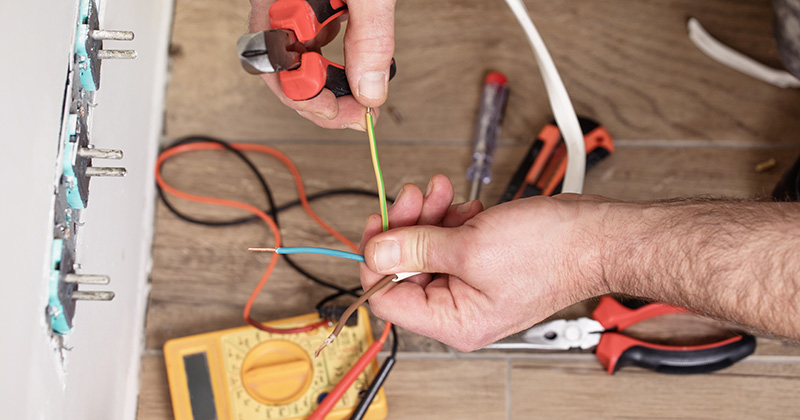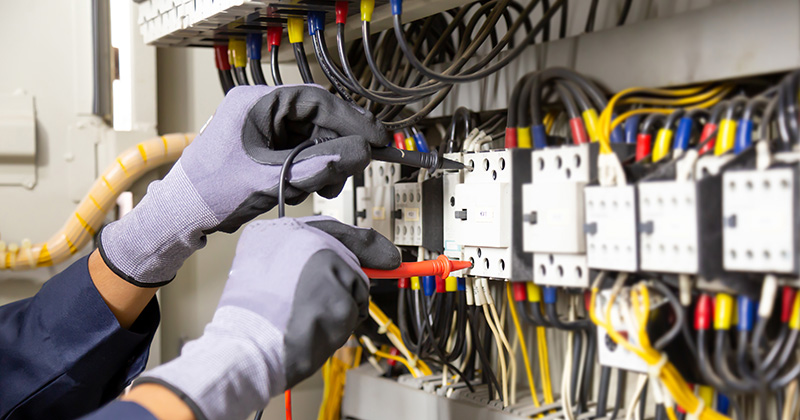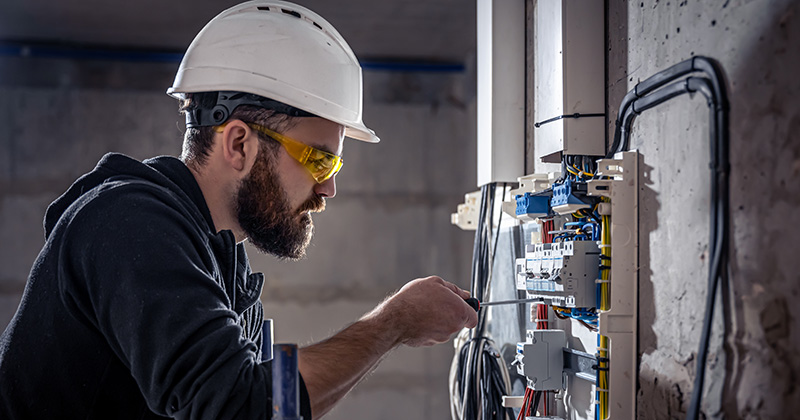Commercial Electrical Work vs. Residential Electrical Work
There are many factors to consider when choosing a focus as an electrician. In this article, we’ll help you decide which area works best for you and your electrical business.

Staff Contributor
Electrical contractors are skilled professionals. Home and business owners alike will always need their services.
In this article, we’ll dive into the commercial vs. residential electrician debate.
We’ll explore their differences. We’ll go over typical services offered. Then, we’ll take a look at common job requests. Finally, we’ll help you decide which is more profitable for you.
Let’s get started.
Commercial vs. Residential Electrician: What’s the Difference?

A residential electrician installs and maintains electrical systems in people’s homes. That includes wiring, outlets, lighting, etc.
A commercial electrician deals with electrical systems and components in commercial buildings. Commercial components can consist of generators, security systems, lighting, and transformers.
Let’s dig into more key differences between the two.
Job Sites
Residential and commercial electricians work in very different job sites.
A certified residential electrician works in places where people live. That could mean fixing existing wiring. Perhaps, bringing an older house up to code. It could also mean working on construction sites to install new electrical systems.
Homeowners can call residential electricians directly. Individual homes make up much of their service. But they can also sign long-term contracts. Construction companies, property managers, and landlords often like to have a “regular” electrician.
Commercial electricians work in much larger spaces. They install and maintain the electrical systems of businesses. Warehouse lighting installation is an example of a commercial electrical project.
They work on the construction of new commercial builds and existing commercial locations. That may mean working outside of normal office hours. The goal is to limit disruption and ensure the safety of employees and the public.
Qualifications and Training
Both residential and commercial electrical contractors must meet certain qualifications. Some of them are the same.
Both types of electricians need a high school diploma or GED. Both might complete a two-year technical program followed by an apprenticeship. Taking an apprenticeship role right away is also an option.
Training begins to differ in the apprenticeship.
An aspiring residential electrician will apprentice with a residential electrical company. A prospective commercial electrician will seek apprenticeship experience with larger commercial electrical systems.
Duties and Responsibilities

Residential and commercial electricians have differing job duties.
For example, commercial electricians work with higher voltages. A residential electrician usually deals with 120 to 240 volts. Commercial electricians might work with systems that surpass 240 volts.
Residential wiring is generally on a smaller scale. It’s also simpler than commercial wiring. Wires in homes are often insulated in plastic and tucked into crawl spaces.
In contrast, wiring systems in large commercial buildings might run through tube conduits.
A commercial electrician might also have extra factors to consider. For example, critical services like hospitals and police still need to function in a blackout. They would need a backup power source.
What Services Do Commercial Electrical Businesses Offer?
Some of the services commercial electrical businesses offer include:
- Design and installation of new electrical systems
- Maintenance of existing electrical systems
- Installations of any specialized electrical equipment
- Breaker box upgrades, repairs, and installations
- In-ground mains connection
- Wiring systems
- Safety switch installations
- Tagging of electrical equipment
- Testing lighting, electrical outlets, and equipment
- Security lighting, alarms, and other systems
- Sports field and court lighting
- Troubleshooting faults and performing repairs
- Responding to electrical emergencies, such as power outages
What Services Do Residential Electrical Businesses Offer?
Residential electrical businesses offer the following services, among others:
- Electrical work for home improvement and renovation
- New home wiring, lighting, and outlet planning and installation
- Home rewiring
- Breaker box upgrades, repairs, and installations
- General electrical maintenance
- Smart home technology and automation setup
- Data and communications wiring
- Electrical appliance installation
- Home theater and entertainment setups
- Lighting, fittings, and power outlet installation or replacement
- Outdoor lighting, outlets, and other electrical fixtures
- Security systems and lighting
- Smoke alarm installation
- Fault finding
- Safety switch installation
- Surge protection
- Insurance reporting
While these two service sets give an overview of the differences between the two jobs. It might not give you a bigger picture of how those services fit into different projects.
Some of the services seem to be the same. But they differ in size. The scope of a project may determine your interest.
If you prefer single jobs that take some time, commercial electric could be ideal. But several smaller jobs might keep things more interesting for you. In that case, residential electric might be a better fit.
When it comes to settling the commercial vs. residential electrician debate, it helps to explore some projects you would be working on.
What Are Some Common Commercial Electrical Projects?

Among the most common commercial projects are security system installations. Planning and installing wiring for new commercial builds is also a frequent request. Of course, general electrical maintenance in a commercial building is very common too.
In this section, we’ll explore two other commercial electrical projects in greater detail.
Office Renovation and Fit-Out
A digital marketing company has recently signed a lease on office space. Right now, it’s a blank slate.
The company is renovating the space. They need to add productivity features. Those features include IT, lighting, and data cabling.
They call in a team of commercial electricians to plan and install the electrical needs. The electricians work closely with other tradespeople. This ensures their work fits the use of the office.
The electrical team impresses the company. They will now be called to maintain the systems they installed.
Warehouse Construction
A manufacturer is planning a new warehouse. It requires a significant power supply and a backup generator. They call an industrial electrician.
An industrial electrician is a specialist. Their focus is electrical work in factories and other industrial settings.
The industrial electrician plans electrical system strategies. Those strategies ensure the manufacturer is up and running quickly. They also must meet all safety regulations.
What Are Some Common Residential Electrical Projects?
Many common residential electrical services consist of installation, upgrades, or repair. But advances in household tech mean new types of projects.
Let’s take a closer look at two of them.
Upgrading to Smart Home Technology
In 2021, 41.9% of households in the US used a smart home device. By 2025, that figure will rise to 48.4%.
Homeowners are embracing an internet-connected household. Those smart doorbells, thermostats, alarms, lighting, and appliances need someone to install them. That’s where an electrician can help.
A residential electrical contractor consults with a client on their smart home needs. They provide the devices if needed. Then they install them and provide basic training.
They may also need new wiring or outlets to power the added devices.
Installing an Electric Vehicle (EV) Charging Station
80% of EV charging is done at home. As EV use increases, more people will install EV stations in their garages.
EV owners usually charge up overnight or when the car is parked. A homeowner enlists a residential electrician for the project.
The electrician assesses the site and identifies wiring needs. They then install the EV charger fitting the homeowner’s specifications.
Commercial vs. Residential Electrician: Which Is More Profitable?

In the US, the average salary of an electrician is $56,202 per year, plus $9,438 in overtime pay. However, earning potential goes up when you own your own business.
The question is, are you better off in commercial or residential electrical services? Who makes the most profit in the end?
There’s no one answer.
A commercial electrical company might take on larger projects. That drives higher revenue. But starting a commercial electrical business means a higher upfront investment. You need quality staff with specialized training and equipment.
A residential electrical company tackles smaller projects. It would seem that they pay less on the surface. But the investment to start a residential business is lower. That means profit margins will be higher — at least in the beginning.
What you choose should be less about profit. It should heavily weigh your experience and long-term goals.
Do you have experience in the commercial space? What about access to the tools required to complete specialized jobs? If not, a residential focus might be a better choice.
Start Your Journey as an Electrician
With the right approach, both are profitable businesses. Either can be scaled to fit your market. Be sure to consider your experience, expertise, and long-term goals before making a final decision.
Here are some immediate steps to get you moving in the right direction:
- Define your areas of interest. Decide on what types of jobs interest you the most. Once you understand that, you’re on your way to setting your business goals.
- Take stock of your current status. Then you can plan for the future. What qualifications do you have right now? What do you need for the type of electrical work you choose?
- Do the math. Do a side-by-side comparison of the financials. Examine start-up costs as well as potential income and decide which makes more sense for you in the long run.
Misty has been providing engaging content and design for a variety of publications since 2000. When she's not poring over words, she's usually making art, hoarding music and spending time outdoors with her family.

Business Solutions For Field Service Pros
EverPro offers specialized solutions designed for home and field service professionals. We’ve got the business tools to help you get the job done.



